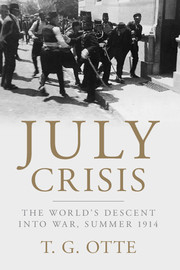Book contents
- Frontmatter
- Dedication
- Contents
- List of illustrations
- List of maps
- Preface and Acknowledgements
- List of abbreviations
- List of the principal dramatis personae
- Europe, 1914
- The Balkans, 1914
- Introduction
- 1 Prelude: the road to Sarajevo
- 2 Sarajevo and its echoes: 28 June to 5 July
- 3 The triumph of tactics over strategy: 6 to 21 July
- 4 Localizing the crisis: 19 to 23 July
- 5 The ultimatum: 23 to 26 July
- 6 Localizing the war: 26 to 28 July
- 7 Escalation: 29 July to 4 August
- Conclusion
- Index
- Plate section
- References
Conclusion
Published online by Cambridge University Press: 05 July 2014
- Frontmatter
- Dedication
- Contents
- List of illustrations
- List of maps
- Preface and Acknowledgements
- List of abbreviations
- List of the principal dramatis personae
- Europe, 1914
- The Balkans, 1914
- Introduction
- 1 Prelude: the road to Sarajevo
- 2 Sarajevo and its echoes: 28 June to 5 July
- 3 The triumph of tactics over strategy: 6 to 21 July
- 4 Localizing the crisis: 19 to 23 July
- 5 The ultimatum: 23 to 26 July
- 6 Localizing the war: 26 to 28 July
- 7 Escalation: 29 July to 4 August
- Conclusion
- Index
- Plate section
- References
Summary
Nescis, mi fili, quantilla sapientia mundus regatur?
AXEL GUSTAFSON OXENSTIERNA (1648)Historia scribitur ad narrandum, non ad probandum, but if it does prove something on account of its accurate depiction, then it has even more value.
JACOB BURCKHARDT (1864)And further, by these, my sonne, be admonished: of making many bookes there is no end, and much studie is a wearinesse of the flesh.
ECCLESIASTES 12:12 (1611 KING JAMES BIBLE)The ‘Bogey has come at last’, noted the Sussex solicitor and polymath, Edward Heron-Allen, in his diary at midnight on 3 August 1914. During his thirty years as a professional lawyer, he reflected, ‘when people consulted their legal and financial advisers about the highest classes of “gilt-edged” investments, they always asked the stereotypical question “Is it perfectly safe?” and we always shrugged our shoulders and replied “Unless there is a European war!” – meaning that this was utterly beyond the possibility of belief’.
The bogey had come. But the Great Powers had not somehow ‘slithered over the brink’ without apprehension as if in a fit of absentmindedness, as Lloyd George put it so evocatively in his war memoirs. War had come as a result of individual decisions and a rapid series of moves and countermoves by the chancelleries of Europe, and set against the backdrop of recent shifts in the international landscape and anticipated further changes in the years to come. The Powers did not operate in a vacuum. If, in 1914, there was no formal and largely institutionalized framework of international politics of the kind that exists today at different levels, there was nevertheless a system of Great Power politics – the European concert, with its norms of behaviour, accepted rules of conduct, and conflict-solution mechanisms.
- Type
- Chapter
- Information
- July CrisisThe World's Descent into War, Summer 1914, pp. 505 - 524Publisher: Cambridge University PressPrint publication year: 2014

